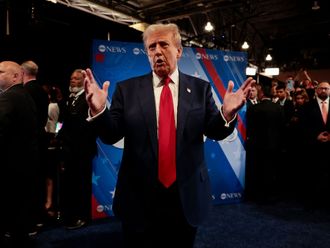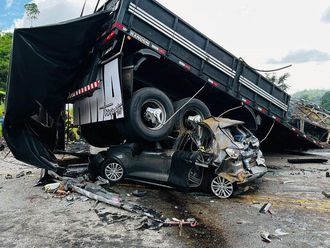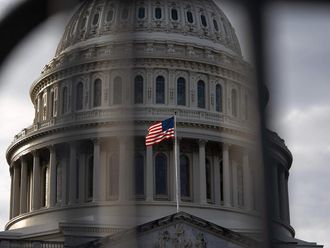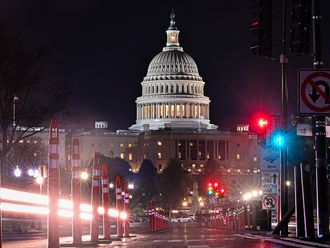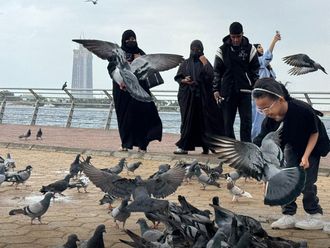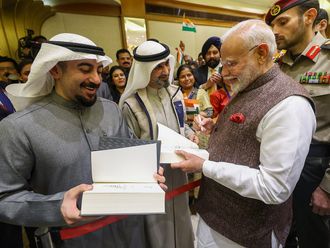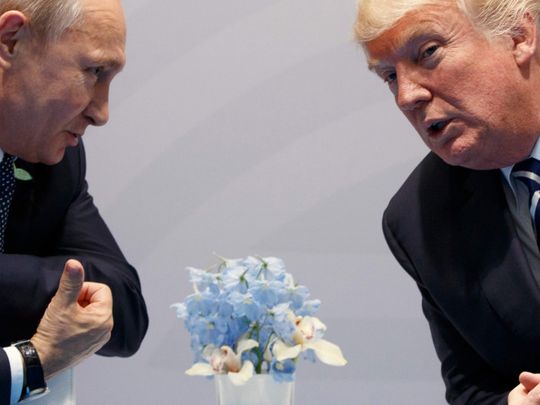
WARSAW: The Nato leader warned on Sunday that Donald Trump was putting the safety of US troops and their allies at risk after the Republican presidential front-runner said Russia should be able to do “whatever the hell they want” to alliance members who don’t meet their defense spending targets.
Trump’s remarks caused deep concern in Poland, a country in central Europe that has been under Russian control more often than not since the end of the 18th century. Defence Minister Władysław Kosiniak-Kamysz said “no election campaign is an excuse for playing with the security of the alliance.”
Speaking on Saturday at a rally in Conway, South Carolina, Trump recalled how as president he told an unidentified Nato member that he would “encourage” Russia to do as it wishes in cases of Nato allies who are “delinquent.”
“‘You didn’t pay? You’re delinquent?’” Trump recounted saying. “‘No I would not protect you. In fact, I would encourage them to do whatever the hell they want. You gotta pay. You gotta pay your bills.’”
Also read
- US Supreme Court arguments begin in landmark case seeking to kick ex-President Trump off ballot over Capitol attack
- Israeli PM Netanyahu hits back at far-right minister Ben-Gvir’s criticism of US war backing
- US appeals court rejects Trump sweeping immunity claim
- UK judge dismisses Trump’s lawsuit over dossier containing ‘shocking and scandalous claims’
Nato Secretary-General Jens Stoltenberg said that the 31 allies are committed to defending each other.
“Nato remains ready and able to defend all allies. Any attack on Nato will be met with a united and forceful response,” Stoltenberg said. “Any suggestion that allies will not defend each other undermines all of our security, including that of the US, and puts American and European soldiers at increased risk.”
Stoltenberg added in his statement that he expects that, “regardless of who wins the presidential election, the US will remain a strong and committed Nato ally.”
Fears run high
The German government did not officially comment on Trump’s remarks, but the country’s foreign office published a statement pointing out Nato’s principle of solidarity.
“‘One for all and all for one.’ This Nato creed keeps more than 950 million people safe — from Anchorage to Erzurum,” the Foreign Ministry said on X, formerly Twitter.
German daily Frankfurter Allgemeine Zeitung wrote in an editorial that “if Trump will become US president again, such statements will increase the risk of Putin expanding his war. Europeans can only do one thing to counter this: finally invest in their military security in line with the seriousness of the situation.”
Trump’s comments were of particular concern to Nato’s front-line countries, like Poland and the Baltic states of Lithuania, Latvia and Estonia, which were either under the control of Moscow or fully incorporated into the Soviet Union during the Cold War. Fears there run especially high given Russia’s war in Ukraine.
While in office, Trump had already threatened not to come to the aid of any country under attack that he considered owed Nato and the US and was not spending enough on defense. His stance destabilized the alliance, particularly countries with borders close to Russia.
Under Nato’s mutual defence clause, Article 5 of its founding treaty, all allies commit help of any member who comes under attack. Article 5 has only ever been activated once — by the US in the wake of the September 11, 2001, attacks.
After Russia annexed Ukraine’s Crimean Peninsula in 2014, Nato leaders agreed to halt the defence spending cuts made after the end of the Cold War and start moving toward spending 2 per cent of gross domestic product on their military budgets. No country is in debt to another, or to Nato.
Nato has undertaken its biggest military buildup since the Cold War since Russia started war in Ukraine in February 2022.


